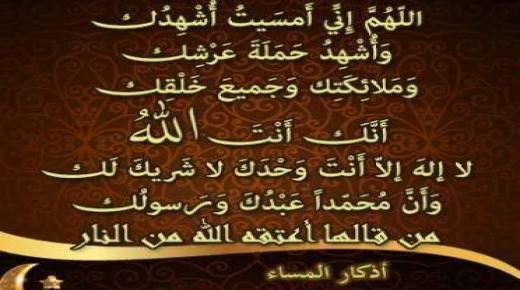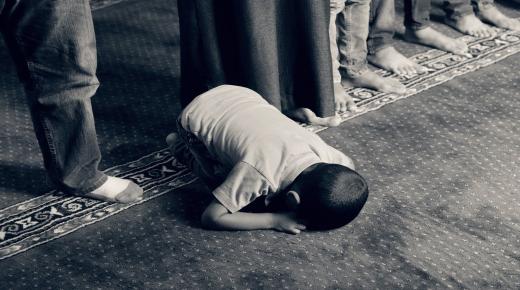
The remembrance of God to the Muslim is a fortress to which he shelters. The weak person must, when he fears, remember a strong man and strengthen his connection with him in order to reassure his heart. And who is stronger than God, we rush to in our crises, indeed in all our times, for God (Glory be to Him) said: (Those who believe and whose hearts are reassured by the remembrance of Allah). Verily, in the remembrance of God do hearts find rest” [Al-Ra’d: 28].
Evening remembrances written
The evening remembrances are divided into remembrances that came in the Holy Qur’an, and remembrances that came in the Prophet’s Sunnah.
Evening remembrance from the Holy Quran:
We start by seeking refuge, and then we recite Ayat al-Kursi for the great virtue to recite it every night. It was narrated that Umar wrestled with a genie, and Umar (may God be pleased with him) threw him down, so the genie said to him: Leave me until I teach you what you abstain from us, so he abandoned him and asked him, and he said: You abstain from us. Ayat al-Kursi.
1- أَعُوذُ بِاللهِ مِنْ الشَّيْطَانِ الرَّجِيمِ “اللّهُ لاَ إِلَـهَ إِلاَّ هُوَ الْحَيُّ الْقَيُّومُ لاَ تَأْخُذُهُ سِنَةٌ وَلاَ نَوْمٌ لَّهُ مَا فِي السَّمَاوَاتِ وَمَا فِي الأَرْضِ مَن ذَا الَّذِي يَشْفَعُ عِنْدَهُ إِلاَّ بِإِذْنِهِ يَعْلَمُ مَا بَيْنَ أَيْدِيهِمْ وَمَا خَلْفَهُمْ وَلاَ يُحِيطُونَ بِشَيْءٍ مِّنْ عِلْمِهِ إِلاَّ بِمَا شَاء وَسِعَ كُرْسِيُّهُ the heavens and the earth, and their preservation tires Him not, and He is the Most High, the Great.” [Ayat Al-Kursi - Al-Baqara 255], and whoever says it in the evening is a hirer from the jinn until the morning, and it is read once.
2- “The Messenger believed in what was revealed to him from his Lord, and the believers. Everyone believes in God, His angels, His books, and His messengers. To him ۚ And they said we heard and obeyed ۖ Your forgiveness, our Lord, and to You is the destiny.
لَا يُكَلِّفُ اللَّهُ نَفْسًا إِلَّا وُسْعَهَا لَهَا مَا كَسَبَتْ وَعَلَيْهَا مَا اكْتَسَبَتْ رَبَّنَا لَا تُؤَاخِذْنَا إِنْ نَّسِينَآ أَوْ أَخْطَأْنَا رَبَّنَا وَلَا تَحْمِلْ عَلَيْنَا إِصْرًا كَمَا حَمَلْتَهُ عَلَى الَّذِينَ مِنْ قَبْلِنَا رَبَّنَا وَلَا تُحَمِّلْنَا مَا لَا طَاقَةَ لَنَا بِهِ وَاعْفُ عَنَّا وَاغْفِرْ لَنَا وَارْحَمْنَا أَنْتَ مَوْلَانَا فَانْصُرْنَا عَلَى الْقَوْمِ الْكَافِرِينَ. [Al-Baqarah 285-286], and read once.
Its virtue is what came from al-Nu’man Ibn Bashir on the authority of the Prophet (may God’s prayers and peace be upon him) who said: “Indeed, God wrote a book two thousand years before He created the heavens and the earth. They are Surah Al-Baqarah, and they are not recited in a house for three nights, lest Satan approach it.”
Narrated by Al-Tirmidhi, Sheikh Al-Albani said it is true
And we complete with you the evening remembrances from the Qur’an
3- We read Al-Ikhlas and Al-Mu’awwidhatayn:
“Say: He is God, one, God the Eternal, He begets not, nor is He begotten, and there is none equal to Him.” And it is recited three times.
Say, “I seek refuge in the Lord of the daybreak, from the evil of what He created, and from the evil of darkness when it approaches, and from the evil of the blowers in knots, and from the evil of an envious person.”
It is read three times.Say, I seek refuge in the Lord of the people, the King of the people, the God of the people, from the evil of the whispers of the people, who whispers into the breasts of the people, and read it three times from the people and the heaven.
Do you recite Al-Ikhlas once, then Al-Falaq once, then Al-Nas once, then repeat it twice after that? Or do you recite Al-Ikhlas three times, and so is Al-Falq and Al-Nas?
The Messenger of God (may God bless him and grant him peace) did not mention any preference for either of the two cases over the other, but he said regarding the virtue of reading them:
On the authority of Abdullah bin Khabib (may God be pleased with him), he said: The Messenger of God (may God bless him and grant him peace) said: Say, I said, O Messenger of God, what should I say? He said: Say: He is God, the One, and the two exorcists in the evening and in the morning three times will suffice you from everything.
Narrated by Al-Nasa'i in his Sunan.
Evening remembrance of the honorable year:
“أَمْسَيْـنا وَأَمْسـى المـلكُ لله وَالحَمدُ لله، لا إلهَ إلاّ اللّهُ وَحدَهُ لا شَريكَ لهُ، لهُ المُـلكُ ولهُ الحَمْـد، وهُوَ على كلّ شَيءٍ قدير، رَبِّ أسْـأَلُـكَ خَـيرَ ما في هـذهِ اللَّـيْلَةِ وَخَـيرَ ما بَعْـدَهـا، وَأَعـوذُ بِكَ مِنْ شَـرِّ ما في هـذهِ اللَّـيْلةِ وَشَرِّ ما بَعْـدَهـا My Lord, I seek refuge in You from laziness and bad old age, my Lord, I seek refuge in You from punishment in the Fire and punishment in the grave.”
It is said once.“اللّهـمَّ أَنْتَ رَبِّـي لا إلهَ إلاّ أَنْتَ، خَلَقْتَنـي وَأَنا عَبْـدُك، وَأَنا عَلـى عَهْـدِكَ وَوَعْـدِكَ ما اسْتَـطَعْـت، أَعـوذُ بِكَ مِنْ شَـرِّ ما صَنَـعْت، أَبـوءُ لَـكَ بِنِعْـمَتِـكَ عَلَـيَّ وَأَبـوءُ بِذَنْـبي فَاغْفـِرْ لي فَإِنَّـهُ لا يَغْـفِرُ الذُّنـوبَ إِلاّ أَنْتَ”، وهذا الذِكر يقرأ مرة واحدة، فهو The master of seeking forgiveness is the one who says it during the night while he is certain of it and dies before morning comes, then he is among the people of Paradise.
“I am satisfied with God as my Lord, with Islam as my religion, and with Muhammad (may God’s prayers and peace be upon him) as my Prophet.” And it is Sunnah to recite it three times, and you will have a great reward for it, because whoever says it in the morning and in the evening, it is God’s right to please him on the Day of Resurrection, as the Messenger of God (peace be upon him) said الله عليه وسلم): مَا مِنْ عَبْدٍ مُسْلِمٍ يَقُولُ حِينَ يُصْبِحُ وَحِينَ يُمْسِي ثَلَاثَ مَرَّاتٍ: رَضِيتُ بِاللَّهِ رَبًّا، وَبِالْإِسْلَامِ دِينًا، وَبِمُحَمَّدٍ (صلى الله عليه وسلم) نَبِيًّا، إِلَّا كَانَ حَقًّا عَلَى اللَّهِ أَنْ يُرْضِيَهُ يَوْمَ الْقِيَامَةِ” رواه الإمام أحمد.
And these simple words require the saying of Paradise with all that is in it.
“Oh God, I have touched you, and I am the lamb of your throne, your angels, and all of your creation, you are God, there is no God, but God is not.
And read every evening four times.And its virtue is that by reading it four times, you free all your body from the fire. In the hadith narrated by Abu Dawud on the authority of Anas bin Malik (may God be pleased with him), on the authority of the Messenger of God (may God bless him and grant him peace), he said: “Whoever says when morning or evening, O God, I am witnessing you and witnessing The bearers of your throne, your angels, and all of your creation, that you are God, there is no god but you, and that Muhammad is your servant and your messenger, God has freed a quarter of him from the Fire.
Oh God, whatever blessing has afflicted me or one of Your creation, it is from You alone, You have no partner, so to You is praise and to You is thanks.”
“حَسْبِـيَ اللّهُ لا إلهَ إلاّ هُوَ عَلَـيهِ تَوَكَّـلتُ وَهُوَ رَبُّ العَرْشِ العَظـيم”، وتقال سبع مرات في المساء، وأصل هذا الذكر من القرآن الكريم في ختام سورة التوبة فَإِن تَوَلَّوْا فَقُلْ حَسْبِيَ اللَّهُ لَا إِلَٰهَ إِلَّا هُوَ ۖ عَلَيْهِ تَوَكَّلْتُ ۖ وَهُوَ رَبُّ الْعَرْشِ الْعَظِيمِ” التوبة (129),
And it came on the authority of Abu Darda’ (may God be pleased with him) that whoever says in the morning and in the evening: God suffices me, there is no god but He in Him, I put my trust in Him, and He is the Lord of the Great Throne seven times.
“In the name of God, with whose name nothing is harmful on earth or in the heavens, and He is the All-Hearing, the All-Knowing.” It is said three times, and its virtue is what Abu Dawood and Al-Tirmidhi narrated on the authority of Othman bin Affan (may God be pleased with him) who said: The Messenger of God (peace and blessings of God be upon him) said: There is no slave who says in the morning of every day and in the evening of every night: “In the name of God, with whose name nothing on earth or in heaven does harm, and He is the All-Hearing, the All-Knowing” three times, nothing will harm Him.
Al-Qurtubi said about this mention: “This is true news, and an honest saying that we taught him its evidence, evidence and experience. Since I heard it, I worked with it, and nothing harmed me until I left it. A scorpion stung me in Medina at night, so I thought, and if I had forgotten to seek refuge with those words.”
“Oh God, with you we have become, and with you we have become, and with you we live, and with you we die, and to you is destiny.” It is recited once, and the Messenger of God used to recite it every evening.
“We are on the authority of Islam, and on the word of the sane, and on the religion of our Prophet Muhammad (may God bless him and grant him peace), and on the religion of our father, the noble of the day,
“Glory be to God and His praise is the number of His creation, the contentment of Himself, the weight of His Throne, and the ink of His words.” It is said three times.
Oh God, heal my body, O God, heal my hearing, O God, heal my sight, there is no god but You.” It is said three times.
“O Allah, I seek refuge in You from disbelief and poverty, and I seek refuge in You from the torment of the grave, there is no god but You.” It is said three times
“اللّهُـمَّ إِنِّـي أسْـأَلُـكَ العَـفْوَ وَالعـافِـيةَ في الدُّنْـيا وَالآخِـرَة، اللّهُـمَّ إِنِّـي أسْـأَلُـكَ العَـفْوَ وَالعـافِـيةَ في ديني وَدُنْـيايَ وَأهْـلي وَمالـي، اللّهُـمَّ اسْتُـرْ عـوْراتي وَآمِـنْ رَوْعاتـي، اللّهُـمَّ احْفَظْـني مِن بَـينِ يَدَيَّ وَمِن خَلْفـي وَعَن يَمـيني وَعَن شِمـالي، وَمِن فَوْقـي، وَأَعـوذُ بِعَظَمَـتِكَ أَن أُغْـتالَ مِن تَحْتـي”، It is said once
“O Living, O Sustainer, by Your mercy, I seek help, rectify all my affairs for me, and do not leave me to myself even for the blink of an eye.” It is said three times.
“We are forgotten and the king of God, the Lord of the two worlds.
“O Allah, Knower of the unseen and the seen, Originator of the heavens and the earth, Lord of all things and their Sovereign, I bear witness that there is no god but You, I seek refuge in You from the evil of evil and Shirk, and that I commit evil against myself or pay it to a Muslim.” It is said once every evening.
“I seek refuge in the perfect words of God from the evil of what He has created” and it is said three times.
“O Allah, bless and bless our Prophet Muhammad,” and it is recited ten times every evening. Whoever says it ten times every evening will receive the intercession of the Chosen One (may God bless him and grant him peace).
“O Allah, we seek refuge in You from associating anything we know with You, and we ask Your forgiveness for that which we do not know” three times.
“Oh God, I seek refuge in you from the god and the sadness, and I seek refuge in you from the miracle and the laziness, and I seek refuge in you from the cow
“I ask forgiveness from God the Great, who there is no god but He, the Ever-Living, the Ever-Sustaining, and I repent to Him” and it is said three times
“O Lord, praise be to You as it should be for the majesty of Your countenance and the greatness of Your authority” and it is said three times
“There is no god but God alone, He has no partner, His is the dominion and His is the praise, and He is capable of everything.” It is said a hundred times and its virtue is that whoever says it is as if he freed ten souls and a hundred good deeds were written for him, and a hundred bad deeds were erased from him, and it was a shield for him.
“اللَّهُمَّ أَنْتَ رَبِّي لا إِلَهَ إِلا أَنْتَ، عَلَيْكَ تَوَكَّلْتُ، وَأَنْتَ رَبُّ الْعَرْشِ الْعَظِيمِ، مَا شَاءَ اللَّهُ كَانَ، وَمَا لَمْ يَشَأْ لَمْ يَكُنْ، وَلا حَوْلَ وَلا قُوَّةَ إِلا بِاللَّهِ الْعَلِيِّ الْعَظِيمِ، أَعْلَمُ أَنَّ اللَّهَ عَلَى كُلِّ شَيْءٍ قَدِيرٌ، وَأَنَّ اللَّهَ قَدْ أَحَاطَ بِكُلِّ Something for knowledge, O Allah, I seek refuge in You from the evil of myself, and from the evil of every animal whose forelock You take. Indeed, my Lord is on a straight and straight path, once.”
“Glory be to God and praise Him,” and he said a hundred times, and his virtue is what was proven on the authority of the Prophet (may God’s prayers and peace be upon him) that he said: “Whoever said, may God bless him and praise Him on a day of time.
Narrated by Malik and Bukhari
Evening remembrances for children
Children have a special nature, so the matter must be repeated once, two, three, and perhaps more often until they get used to it, and therefore the evening dhikr must be repeated often in front of them by all means and means, and the easy verses and dhikr with simple words must be chosen so that it is easy for them to memorize them.
Among the Qur’anic verses in the evening remembrances, we choose for them to recite Surahs of Ikhlas and Al-Mu’awwidhatayn
Among the remembrances that we choose for them are the following for the evening remembrances and also for the morning, and we choose from them.
“I am satisfied with God as my Lord, with Islam as my religion, and with Muhammad (may God bless him and grant him peace) as my Prophet.”
“Oh God, we have become with you, and with you we have become, and with you we live, and with you we die, and to you is the resurrection.”
“Glory be to God and His praise is the number of His creation, the contentment of Himself, the weight of His Throne, and the ink of His words.”
“O God, heal my body, O God, heal my hearing, O God, heal my sight, there is no god but You.
“O Allah, I seek refuge in You from disbelief and poverty, and I seek refuge in You from the torment of the grave, there is no god but You.”
“I seek refuge in the perfect words of God from the evil of what He has created.”
“O Allah, bless and bless our Prophet Muhammad.”
“I ask forgiveness from God the Great, who there is no god but He, the Ever-Living, the Ever-Living, and I repent to Him.”
"Lord, thank you also should Jalal your face and your power is great".
"O Allah, I ask You for beneficial knowledge, and they had a good, and pursuant receptive"
“Glory be to God and His praise”
"God's forgiveness and repent to Him "
Remembrance before bed
Remembrances before bedtime are supposed to be the last work a person does in his day, after which he goes to rest and surrenders himself and his soul to God (Glory be to Him) so that a person ends his day by remembering his Lord. Sleep is a smaller death, so a person is ready to end his life with the remembrance of God as well.
The Messenger (may God’s prayers and peace be upon him) taught the sleep remembrances of the honorable companion Al-Bara bin Azib (may God be pleased with him) and taught them to him by indoctrination. The faith, and say: O God, I have greeted my soul to you, and I delegated my command to you, and I resorted to me, and I have dahd
Die according to the fitrah, and let them be the last thing you say.” Agreed upon.ويقول “بِاسْمِكَ رَبِّـي وَضَعْـتُ جَنْـبي، وَبِكَ أَرْفَعُـه، فَإِن أَمْسَـكْتَ نَفْسـي فارْحَـمْها، وَإِنْ أَرْسَلْتَـها فاحْفَظْـها بِمـا تَحْفَـظُ بِه عِبـادَكَ الصّـالِحـين”، مرة واحدة باسمك ربي وضعت جنبي، وبك أرفعه، إن أمسكت نفسي فارحمها، وإن أرسلتها فاحفظها بما تحفظ به عبادك الصالحين، فعَنْ أَبِي هُرَيْرَةَ (رضى الله عنه) قَالَ: قَالَ النَّبِيُّ (صلى الله عليه وسلم): (إِذَا أَوَى أَحَدُكُمْ إِلَى فِرَاشِهِ فَلْيَنْفُضْ فِرَاشَهُ بِدَاخِلَةِ إِزَارِهِ فَإِنَّهُ لَا يَدْرِي مَا خَلَفَهُ عَلَيْهِ ثُمَّ يَقُولُ: بِاسْمِكَ رَبِّ وَضَعْتُ جَنْبِي، وَبِكَ أَرْفَعُهُ، إِنْ أَمْسَكْتَ نَفْسِي فَارْحَمْهَا، And if you send it, then protect it as you protect your righteous servants) Narrated by Al-Bukhari and Muslim
ويقول “اللّهُـمَّ قِنـي عَذابَـكَ يَـوْمَ تَبْـعَثُ عِبـادَك”، ثلاث مرات، لقول السيدة حَفْصَةَ (رضى الله عنها) أَنَّ رَسُولَ اللَّهِ (صلى الله عليه وسلم) كَانَ إِذَا أَرَادَ أَنْ يَرْقُدَ وَضَعَ يَدَهُ الْيُمْنَى تَحْتَ خَدِّهِ ثُمَّ يَقُولُ: (اللَّهُمَّ قِنِى عَذَابَكَ يَوْمَ تَبْعَثُ عِبَادَكَ ) three times.
What is the evening adhkar time?
What is the best time to read the evening supplications?
The time of the evening begins at the time after the afternoon prayer until the sunset, and the scholars inferred the noble verse:﴿ So be patient with what they say and praise the praise of your Lord before the sun and the rituals of the rituals,
As for what comes after the Maghrib prayer time, i.e. after sunset, it is called “the night” and not the evening, and there are scholars who consider that the intended evening extends to half the night, and some of them considered the evening to be between sunset until dawn, and among them Ibn Al-Jawzi - may God have mercy on him -.
Based on this, the most likely and correct saying is that the evening is after the afternoon until sunset, which is the best time for the evening remembrance and what comes after it is less than it in virtue. For the Sunnah of His Prophet (may God bless him and grant him peace).
Benefits of evening remembrances
And the Messenger of God (may God bless him and grant him peace) taught us remembrances to recite when evening comes, when night approaches its entry, and the day ends with its hustle, work, and tiredness in which evening comes, and the calmness of the night so that the Muslim begins to remember his Lord and to be intimate with Him and His love, and to renew the covenant that you are a servant who draws near to your Lord ( Glory be to Him) in your night and day alike, and for God to surround you with His care and protection and for the circle of remembrance to be completed by connecting night with day until you meet your Lord (Glory be to Him).
What is the virtue of the evening remembrances?
The evening remembrance has great virtue, as it is a door to many good deeds, so what people need are those good deeds that are achieved from the evening remembrance! On the Day of Resurrection, all people will need every good deed, for one good deed may be salvation from the horror of that day.
Among the evening remembrances are verses and remembrances, if the servant recites it at night, it suffices him from every worry and grief, and from every anguish and from all that concerns him from the matter of this world and the Hereafter. The Day of Resurrection, and among them is the one who recites it in the evening, and the one who says it in the evening gives thanks for his day.
Let every Muslim be keen on reading it, adhering to it, and not forgetting it, as a few minutes will bring you great goodness in this world and the Hereafter.
Evening remembrance voice
For those who do not find the time or the ability to read due to preoccupation or any other circumstance, it is possible to hear the recorded dhikrs of the major reciters, and recordings of them are available on the Internet for various voices. The car, at home, and so on, and that is from God’s facilitation for us, and praise be to God, Lord of the Worlds



